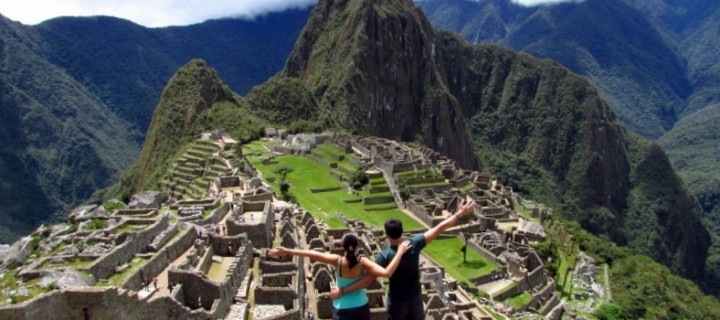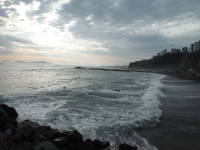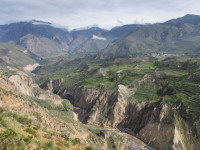Leaving Arequipa with great memories, we are off on a 10 hour overnight bus to Cusco, the capital of the Incas. The bus ride is actually not that bad as we found this great Peruvian bus company called Cruz Del Sur. It’s by far the best bus company we have ever ridden before.
Cusco or Cuzco in English, is a wonderful small city. With only one million inhabitants, this city is still relatively safe and small compare to their counterparts of Lima or Arequipa. The plaza de Armas is big and has the biggest cathedral in Peru, even bigger than the one in Lima. Since we got to the city so early, around 6 AM, we were able to enter the cathedral without a charge and see its beauty. From 9 to 10 AM, there is a mass which we participated on, then we visited the inside. Its decorated with beautiful sculptures and paintings all around. The usual cost is of 10 soles, but definitely worth the money if you don’t go before 10 AM.
Cusco has also a huge local market called San Pedro market. This is quite a scene is everything you could think of. From clothes, to meat (specially the heads of pigs) to local restaurants, juice stands, cheeses, and even hardware stands. This used to be the market back in the day before supermarkets and malls started to appear in Cusco. It’s definitely worth the visit at least once while in the city and experience all of the colors, smells and sounds this huge market brings.
We decided to do a free walking tour as it’s the best way to discover the capital of the Incas and everything it has to offer. We recommend it as it’s a great tour and you get free Pisco sour, the local and most popular alcoholic drink in Peru. 😉
A little history of Cusco
The tour starts with a bit of history of Cusco. The city used to be called Qosqo, or center of the earth. Back in the 1400s, the incas thought to be the only ones around. By the 9th emperor, the incas started to expand around South America, and Cusco was in the center of it all, therefore the name. The incas are thought to had been around for about 100 years before the Spanish came to conquer it all. They were able to build some amazing sites and trails that connected Cusco with all of the 4 different regions they conquered. They pretty much controlled Peru, Bolivia, north of Chile and Argentina, Ecuador and south of Colombia. Quite big territory which they controlled very well, plus created amazing sites that are still very well maintained for the years they have been up. The Incas adored mountains, animals, the sun and moon. They were in some way their religion!
Most of the sites and ruins are shaped in some sort of animals. They had 3 different worlds in their religion: the spiritual, physical and under world. The puma was the symbol of the physical world, the condor for the spiritual world and finally the snake, symbol of the underground world.
For example, Cusco was built in shape of a Puma. Some other ruins around the sacred valley have shapes of lying llamas or condors. As well, other buildings around the city have stones in shapes of a serpents or condors.
Anyway, after many earthquakes in Cusco, they have rebuilt many of the structures and building around the city, also stretching the streets for cars and giving way to new hotels and restaurants. A lot of things have been preserved by the government as a way for tourism, given that Cusco depends highly on tourists since it’s the gateway to make way to Machu Picchu. Cusco is definitely worth the stay for two or three days to enjoy the nice energy and atmosphere around of the once called the center of the earth.
What else to do in Cusco?
The Inca Ruins
We hiked up to the Sacsaywaman ruins which are a waking distance from the main plaza. We can walk up by Pumacurco street from Plaza de Armas to the ruins. There is a tourist ticket (boleto touristico) required to enter the site. It costs 130 soles per person. This ticket includes the entrance the ruins around the sacred valley plus a couple of museums in Cusco, valid for up to 10 days. It’s worth the price to visit the valley.
Otherwise each site have single entrances at 70 soles.
To have an overview of the ruins around Cusco for free, it is possible to go to the view point by the white Christ. The views from here are breathtaking!
Museums
Museums are another popular things to do in Cusco. There is the Inca museum, a Machu Picchu museum and other interesting ones like the Coca and chocolate museums. Most of them are closed on Sundays.
Coca tea 🙂
One big recommendation for Cusco is to be careful with the altitude. Cusco is at 3,400 meters above sea level (11,000 feet) and at first it’s really hard to get used to it. Coca leaves are a must for acclimate the body to the altitude. Some pharmacies also sell oxygen cans, which can be useful too. Since we had been in Bolivia at much higher altitudes, this was not much of an issues for us even though we would get short of breath from time to time.
Machu Picchu – our advice
Cusco is the gateway for Machu Picchu but making the right decisions on how to go there will save you money in the long run. Also depends on the time you have and how you want to experience it. Keep in mind, you cannot reach Machu Picchu Pueblo (Aguas Calientes) by bus but only by train, hiking from Hidroelectrica (3 hours walk) or finally by doing a trek with an agency.
Trains to Machu Picchu Pueblo
The easiest and most convenient way is to take the train. There are two choices, Inca Rail or Peru Rail. Both are supposed to be English companies that overcharge tourists to make it to Machu Picchu. The tickets cost between $55 and $60 dollars one way, departing from the city of Ollataytambo only. Peru Rail offers some extra services to take you by bus to Ollataytambo and connect with the train there but of course it’s more expensive. The local mini buses or private cars to Ollataytambo departs from Pavito street every 10 to 15 minutes, depending on how many people are ready to leave.
Inca trail or hiking alternatives
One of the most popular choices for the adventurous is to hike the famous Inca Trail. As I mentioned in the history part, the incas have made lots of trails that connected all of the differents parts of the empire from Cusco. The inka trail can be done on 2 to 5 days, accommodation, food, tickets for the Machu Picchu included. The best months to do the hike are from June to October, during the dry season. These hikes can be challenging and being in a good physical shape is an asset.
We didn’t do it as is quite of an investment. The 5 days trek costs around $580 and must be reserved way in advance. The Inca trail can be only done via an agency with a licensed guide tour and a permit. Only 500 permits are delivered to people daily.
Of course, it’s very rewarding at the end, to do the same hike that the Incas did to get to Machu Picchu. In addition to this the views along the way are know to be spectacular.
Some reviews we have read said that by the time you get to Machu Picchu, you are so exhausted it gets hard to enjoy the site. Others said it’s the most rewarding experience they have ever done. We will leave it up to each individual’s preference.
The other two choices for people who want to hike is the jungle trail or the Salkantay trail. We have friends who did both and both loved the experience. Both of these trails are less expensive than the inca trail and have fun activities like zip lining, hot springs baths, mountain biking and more. There are also around 4 days 3 nights and end up exhausted but they are both fun according to our friends.
Bus to Hidroelectrica and hike
Hidroelectrica is the closest town to Machu Picchu pueblo, around 2,5 hours walking from it. This town can be reached by bus from Cusco. Once in Hidroelectrica, you can hike along the river to Machu Picchu Pueblo. Unfortunately, this was the way we wanted to go but due to heavy rains, the main bridge connecting Hydroelectrica felt down and was being repaired. After buying the stupidly high train tickets we found out there was a walking bridge next to it which was in use and only added 15 minutes to the walk.
Machu Picchu Pueblo
Machu Picchu pueblo was for us nothing special as it is only about restaurants and souvenirs shops. Prices are more expensive as well. Many people didn’t like at all this small town but we thought it had some kind of cute aspects such as the narrow streets, the impressive surrounding mountains and the hot springs at the end of the main road going north.
The hot springs are only 3 minutes from the center uphill and it costs 10 soles per person. We must admit it is not the nicest hot springs we have experienced so far, but it is a good place to relax and a have drink. If you are hungry and thirsty, for sure thousands of restaurants will offer different menu touristico with happy hours; 4 Pisco sour for 20 soles, it is not too bad 😉
Finally the famous and majestic Machu Picchu
The day before, we were very excited to get the ruins. I mean it is one of the most important and mysterious Inca site in the world. It is full of history and learning about it always makes way for more questions and wanting to know more about it.
Having prepared our small backpack in our hostel in town, we went to bed early as we had to wake up at 4:00 AM in the next morning.
There are actually two ways to get to the entrance:
Either hiking from the town to the stairs all the way up to the main entrance. The hike lasts around 1 hour. The sportive people would make it in 45 minutes.
Or the other way is by bus that costs about 40 soles per person, each way! which a bit steep.
In any case it is important to carry at least 2 liters of water before visiting Machu Picchu. Once up there, the restaurants charge insane prices for water and food.
Tickets
It’s very recommended to book the Machu Picchu tickets way in advance, specially if you want to hike up Uyanapicchu, which is the big mountain next to it and where you can go to the temple of the moon as well. Uyanapicchu only allows 400 people a day, during 7 to 8 AM or 10 to 11 AM. Tickets go fast so make sure to buy the tickets in this site http://www.machupicchu.gob.pe/. The best slots is at 10 AM as it may be cloudy beforehand.
It is also possible to hire a guide after the hike or before depending on the slots, in order to get some information on the site and the history (15 soles per person). We did it and we were happy to get interesting information and facts on Machu Picchu.
In overall, Machu Picchu has been splendid. It’s really an experience to have once in a life time. The energy on the site is intriguing and the site still hold some mysteries. We will keep its history for another article or do not hesitate to ask us for more information 🙂
Now we are off for Pisac, a cute small town in the middle of the sacred valley for some well deserved yoga, meditation and relaxation time!
Enjoy the pictures 🙂

















































































Pingback: Pisac and the Sacred Valley of the Incas | PilotFish Traveling around the world, discovering South Asia and South America in a year